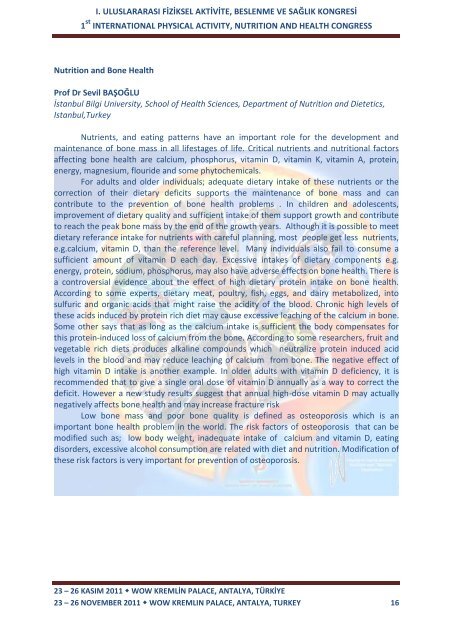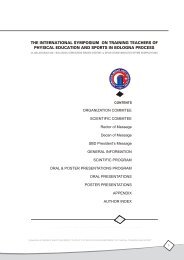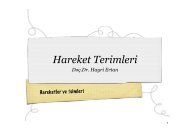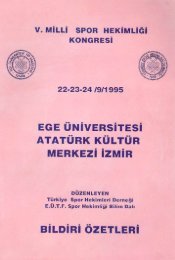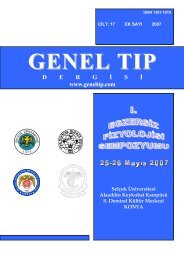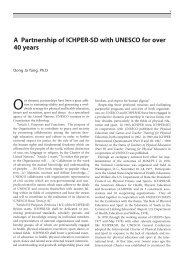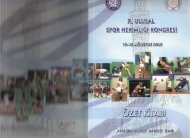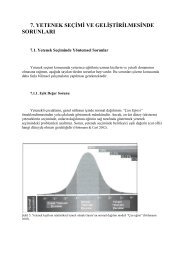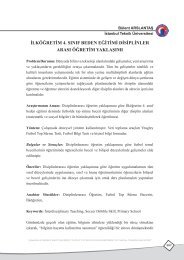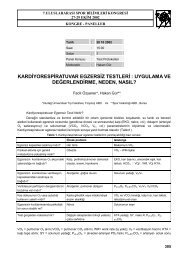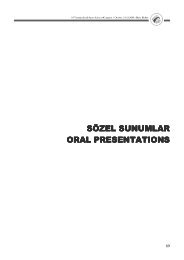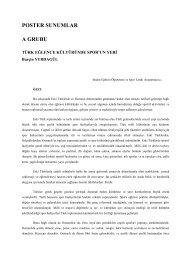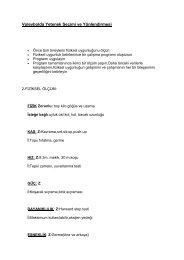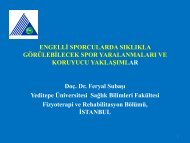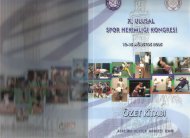POSTER BİLDİRİLER - Spor Bilim
POSTER BİLDİRİLER - Spor Bilim
POSTER BİLDİRİLER - Spor Bilim
Create successful ePaper yourself
Turn your PDF publications into a flip-book with our unique Google optimized e-Paper software.
I. ULUSLARARASI FİZİKSEL AKTİVİTE, BESLENME VE SAĞLIK KONGRESİ<br />
1 st INTERNATIONAL PHYSICAL ACTIVITY, NUTRITION AND HEALTH CONGRESS<br />
Nutrition and Bone Health<br />
Prof Dr Sevil BAŞOĞLU<br />
İstanbul Bilgi University, School of Health Sciences, Department of Nutrition and Dietetics,<br />
Istanbul,Turkey<br />
Nutrients, and eating patterns have an important role for the development and<br />
maintenance of bone mass in all lifestages of life. Critical nutrients and nutritional factors<br />
affecting bone health are calcium, phosphorus, vitamin D, vitamin K, vitamin A, protein,<br />
energy, magnesium, flouride and some phytochemicals.<br />
For adults and older individuals; adequate dietary intake of these nutrients or the<br />
correction of their dietary deficits supports the maintenance of bone mass and can<br />
contribute to the prevention of bone health problems . In children and adolescents,<br />
improvement of dietary quality and sufficient intake of them support growth and contribute<br />
to reach the peak bone mass by the end of the growth years. Although it is possible to meet<br />
dietary referance intake for nutrients with careful planning, most people get less nutrients,<br />
e.g.calcium, vitamin D, than the reference level. Many individuals also fail to consume a<br />
sufficient amount of vitamin D each day. Excessive intakes of dietary components e.g.<br />
energy, protein, sodium, phosphorus, may also have adverse effects on bone health. There is<br />
a controversial evidence about the effect of high dietary protein intake on bone health.<br />
According to some experts, dietary meat, poultry, fish, eggs, and dairy metabolized, into<br />
sulfuric and organic acids that might raise the acidity of the blood. Chronic high levels of<br />
these acids induced by protein rich diet may cause excessive leaching of the calcium in bone.<br />
Some other says that as long as the calcium intake is sufficient the body compensates for<br />
this protein-induced loss of calcium from the bone. According to some researchers, fruit and<br />
vegetable rich diets produces alkaline compounds which neutralize protein induced acid<br />
levels in the blood and may reduce leaching of calcium from bone. The negative effect of<br />
high vitamin D intake is another example. In older adults with vitamin D deficiency, it is<br />
recommended that to give a single oral dose of vitamin D annually as a way to correct the<br />
deficit. However a new study results suggest that annual high-dose vitamin D may actually<br />
negatively affects bone health and may increase fracture risk<br />
Low bone mass and poor bone quality is defined as osteoporosis which is an<br />
important bone health problem in the world. The risk factors of osteoporosis that can be<br />
modified such as; low body weight, inadequate intake of calcium and vitamin D, eating<br />
disorders, excessive alcohol consumption are related with diet and nutrition. Modification of<br />
these risk factors is very important for prevention of osteoporosis.<br />
23 – 26 KASIM 2011 WOW KREMLİN PALACE, ANTALYA, TÜRKİYE<br />
23 – 26 NOVEMBER 2011 WOW KREMLIN PALACE, ANTALYA, TURKEY 16


